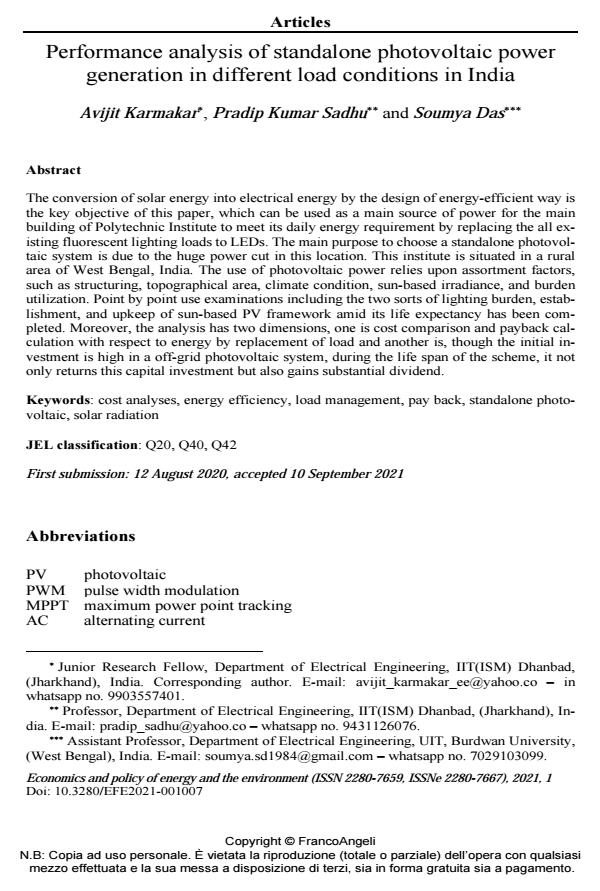Performance analysis of standalone photovoltaic power generation in different load conditions in India
Titolo Rivista ECONOMICS AND POLICY OF ENERGY AND THE ENVIRONMENT
Autori/Curatori Avijit Karmakar, Pradip Kumar Sadhu, Soumya Das
Anno di pubblicazione 2021 Fascicolo 2021/1
Lingua Inglese Numero pagine 22 P. 121-142 Dimensione file 315 KB
DOI 10.3280/EFE2021-001007
Il DOI è il codice a barre della proprietà intellettuale: per saperne di più
clicca qui
Qui sotto puoi vedere in anteprima la prima pagina di questo articolo.
Se questo articolo ti interessa, lo puoi acquistare (e scaricare in formato pdf) seguendo le facili indicazioni per acquistare il download credit. Acquista Download Credits per scaricare questo Articolo in formato PDF

FrancoAngeli è membro della Publishers International Linking Association, Inc (PILA), associazione indipendente e non profit per facilitare (attraverso i servizi tecnologici implementati da CrossRef.org) l’accesso degli studiosi ai contenuti digitali nelle pubblicazioni professionali e scientifiche.
The conversion of solar energy into electrical energy by the design of energy-efficient way is the key objective of this paper, which can be used as a main source of power for the main building of Polytechnic Institute to meet its daily energy requirement by replacing the all exist-ing fluorescent lighting loads to LEDs. The main purpose to choose a standalone photovoltaic system is due to the huge power cut in this location. This institute is situated in a rural area of West Bengal, India. The use of photovoltaic power relies upon assortment factors, such as structuring, topographical area, climate condition, sun-based irradiance, and burden utilization. Point by point use examinations including the two sorts of lighting burden, establishment, and upkeep of sun-based PV framework amid its life expectancy has been completed. Moreover, the analysis has two dimensions, one is cost comparison and payback calculation with respect to energy by replacement of load and another is, though the initial investment is high in a off-grid photovoltaic system, during the life span of the scheme, it not only returns this capital in-vestment but also gains substantial dividend.
Parole chiave:cost analyses, energy efficiency, load management, pay back, standalone photo-voltaic, solar radiation
Jel codes:Q20, Q40, Q42
Avijit Karmakar, Pradip Kumar Sadhu, Soumya Das, Performance analysis of standalone photovoltaic power generation in different load conditions in India in "ECONOMICS AND POLICY OF ENERGY AND THE ENVIRONMENT" 1/2021, pp 121-142, DOI: 10.3280/EFE2021-001007